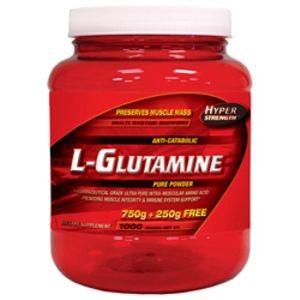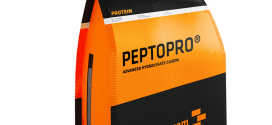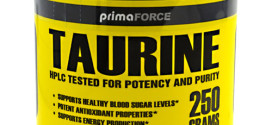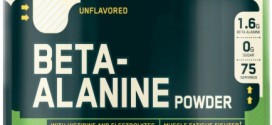Supplement Ingredient Guide: L-Glutamine

What is it?
L-Glutamine is the most common amino acid within the human body, making up 50% of the human body’s amino acids.
It plays a crucial role in mediating growth and plays a big role in liver functions but also acts as a major energy source for muscles, immune cells and cells lining the GI tracts. It also plays a big role in the regulation of protein synthesis.
Indications
L-Glutamine supplementation is very beneficial for those whom are training regularly in aiding them to build more functional muscle by increasing the rate of protein synthesis but also increasing the amount of HGH being produced.
How much should I take?
It’s recommended that you take between 2-5g a day split over 3 times a day one being 30 mins before a training session whilst the other being immediately after.
Research
It’s believed that L-Glutamine is capable of increasing the body’s natural sources of Human Growth Hormones (HGH), it improves the rate of protein synthesis which leads on to an improved rate of recovery. It also helps maintain the free amino acid balance within the body and finally it supports the immune system reducing the risk of infection.
During intense exercise our body uses up glutamine to supply energy for the functioning muscles. The drop varies with the nature of the exercise being done, however it’s been shown that a drop in glutamine leaves the body susceptible to infection due to the immunological effects of glutamine.
Glutamine has also been shown to increase the ability of the body to produce proteins needed for muscle building but it can also prevent muscle breakdown since the body’s reserves are constantly being replenished. This effect is more commonly referred to as the “maintenance of amino acid balance” which leads to a net increase in protein synthesis but also a reduction of over training symptoms and muscle breakdown leading to an increased rate of recovery. The net result in an increase in muscle size and strength.
It’s been shown too that an oral dose of 2g of L-Glutamine can increase the blood levels of HGH within 30 mins as a body’s natural response to regulate the blood acidity levels.
Side effects
None
Compare Glutamine products on SupplementReviews.com
References
1- Antonio, J. and Street, C. (1999) Glutamine: a potentially useful supplement for athletes. Can J Appl Physiol. 24 (1), 1-14.
2- Bompa, T. O., Pasquale, M. D. and Cornacchia, L. J. (2003) Chapter 6: Using Nutritional Supplements.In: Serious Strength Training. Human Kinetics. Leeds, United kingdom.
3- Castell, L. (2003) Glutamine supplementation in vitro and in vivo, in exercise and in immunodepression. Sports Medicine. 33 (5), 323-345.
4- Castell, L. M. and Newsholme, E. A. (1997) The effects of oral glutamine on athletes after prolonged, exhaustive exercise. Nutrition. 13 (7-8), 738-742.
5- Newsholme, E. A. (1994) Biomechanical mechanisms to explain immunosuppression in well-trained and overtrained athletes. International Journal of Sports Medicine. 15, S142-147.
6- Rennie, M. J., MacLennan, P. A., Hundall, H. S. et al., (1989) Skeletal muscle glutamine transport, intramuscular glutamine concentration, and muscle-protein turnover. Metabolism. 38 (8 Suppl 1), 47-51.
7- Smith, R. J. (1990) Glutamine metabolism and its physiologic importance. Journal of Parenatal and Eternal Nutrition. 14, 40S-44S.
8- Welbourne, T. C. (1995) Increased plasma bicarbonate and growth hormone after an oral glutamine. American Journal of Clinical Nutrition. 61, 1058-1061.
 Supplement Judge Unbiased Supplement Reviews – Do they really work??
Supplement Judge Unbiased Supplement Reviews – Do they really work??




